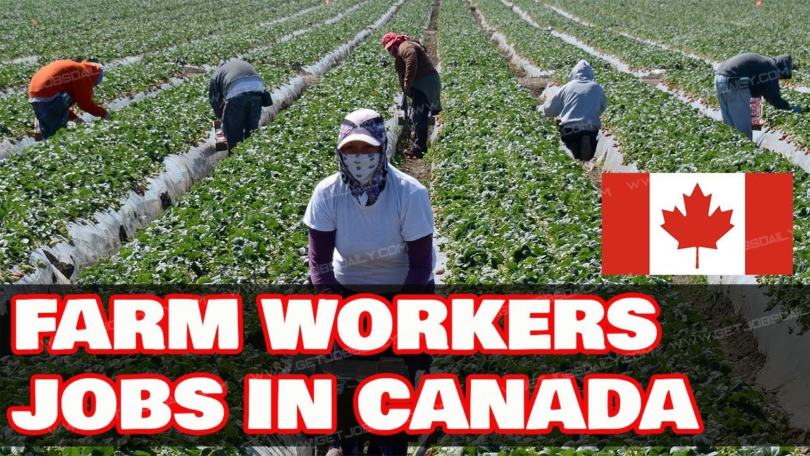Canada’s agricultural sector is an essential component of the national economy, playing a pivotal role in both domestic food production and international export.
With expansive farmlands and diverse crops, there is a constant demand for farm workers, which presents a golden opportunity for immigrants seeking employment in Canada.
Farm worker jobs not only offer a stable source of income but often come with visa sponsorship, facilitating the legal relocation and employment of foreign workers.
For many immigrants, obtaining a job with visa sponsorship is a critical step toward establishing a new life in Canada. These positions are particularly accessible as they typically require minimal prior experience and provide comprehensive on-the-job training. This accessibility makes farm worker roles an attractive option for individuals at the beginning of their Canadian journey. In this detailed guide, we will explore the various facets of farm worker jobs in Canada, from entry-level skills and regional payment structures to application processes and visa options.
Entry-Level Skills and Experience Required
Entry-level farm worker jobs in Canada are designed to be accessible to a broad range of applicants, including those with minimal prior experience in agriculture. These roles typically focus on basic tasks that do not require specialized skills, making them ideal for newcomers to the industry.
Basic Skills
- Physical Stamina: Farm work is physically demanding, requiring long hours of standing, bending, and lifting. Applicants should be in good physical condition.
- Basic Agricultural Knowledge: While not mandatory, a basic understanding of agricultural practices and crop management can be beneficial.
- Teamwork: The ability to work well with others is crucial, as farm work often involves collaborating with a team.
- Adaptability: Farm workers must be able to adapt to varying weather conditions and changing tasks based on the needs of the farm.
On-the-Job Training
Most entry-level positions provide on-the-job training, where workers learn specific techniques and procedures related to planting, harvesting, pruning, and packing. This training helps new workers acquire the necessary skills to perform their duties efficiently.
Experience
Previous experience in farming or agriculture is not typically required for entry-level positions. However, any experience in similar labor-intensive roles can be advantageous and may increase the likelihood of securing a job.
Regions with the Highest Payment Structures
Certain regions in Canada offer higher wages for farm workers due to the scale of agricultural operations and the cost of living. Below are the top five regions with the highest payment structures:
1. British Columbia
- Description: Known for its diverse agricultural sector, including fruit orchards, vineyards, and dairy farms.
- Payment Structure: Average hourly wage ranges from CAD 15 to CAD 20.
2. Alberta
- Description: A major producer of grains, oilseeds, and livestock.
- Payment Structure: Average hourly wage ranges from CAD 14 to CAD 18.
3. Ontario
- Description: Home to a wide range of agricultural activities, including vegetable farms, fruit orchards, and poultry farms.
- Payment Structure: Average hourly wage ranges from CAD 15 to CAD 19.
4. Quebec
- Description: Known for dairy farming, maple syrup production, and horticulture.
- Payment Structure: Average hourly wage ranges from CAD 14 to CAD 17.
5. Manitoba
- Description: A significant producer of grains, oilseeds, and livestock.
- Payment Structure: Average hourly wage ranges from CAD 13 to CAD 16.
Salary Expectations for Immigrants
The table below provides a summary of salary expectations for farm workers in different roles across various regions in Canada:
| Job Role | British Columbia (CAD) | Alberta (CAD) | Ontario (CAD) | Quebec (CAD) | Manitoba (CAD) |
|---|---|---|---|---|---|
| Entry-Level Worker | 30,000 – 40,000 | 28,000 – 36,000 | 30,000 – 38,000 | 28,000 – 34,000 | 26,000 – 32,000 |
| Skilled Worker | 40,000 – 50,000 | 38,000 – 46,000 | 40,000 – 48,000 | 36,000 – 44,000 | 34,000 – 42,000 |
| Supervisor | 50,000 – 60,000 | 46,000 – 55,000 | 48,000 – 58,000 | 44,000 – 54,000 | 42,000 – 52,000 |
| Manager | 60,000 – 70,000 | 55,000 – 65,000 | 58,000 – 68,000 | 54,000 – 64,000 | 52,000 – 62,000 |
These figures provide a general idea of what immigrants can expect to earn in various farm worker roles across different regions in Canada. The actual salary may vary based on the specific employer, farm size, and level of experience.
Companies Hiring Farm Workers in Canada
Several companies and farms across Canada are actively hiring farm workers and offering visa sponsorship to immigrants. Here are some of the prominent ones along with their requirements:
1. SunSelect Produce Inc.
- Requirements: Basic agricultural skills, physical stamina, ability to work in a greenhouse environment.
2. Ferme des Voltigeurs
- Requirements: Experience with poultry farming, ability to handle live animals, basic understanding of farm equipment.
3. Jardins du Saguenay
- Requirements: Experience with fruit picking and packing, ability to work long hours outdoors.
4. Maple Leaf Foods
- Requirements: Experience in livestock farming, ability to work in a fast-paced environment, basic English or French proficiency.
5. NatureFresh Farms
- Requirements: Experience with vegetable farming, ability to operate farm machinery, good physical condition.
Visa Types and Options for Farm Workers
Several visa options are available for immigrants seeking farm worker jobs in Canada:
1. Temporary Foreign Worker Program (TFWP)
This program allows Canadian employers to hire foreign workers to fill temporary labor shortages. Workers under this program can stay in Canada for up to two years, with the possibility of extension.
2. Seasonal Agricultural Worker Program (SAWP)
SAWP is part of the TFWP, designed specifically for agricultural workers from certain countries. Workers can stay in Canada for up to eight months, depending on the season and job requirements.
3. Agri-Food Immigration Pilot
This pilot program targets experienced, non-seasonal workers in the agri-food sector, providing a pathway to permanent residency. Applicants must have at least one year of full-time, non-seasonal work experience in Canada.
4. Provincial Nominee Program (PNP)
Several provinces offer nomination streams for agricultural workers. These programs allow provinces to nominate individuals for permanent residency based on local labor market needs.
Where to Find Farm Worker Job Opportunities In Canada
Finding farm worker job opportunities in Canada can be facilitated by using various resources:
1. Job Bank
The Government of Canada’s Job Bank is an extensive resource for job listings across various sectors, including agriculture.
2. AgCareers
This specialized job board focuses on agricultural employment, providing a platform for job seekers to connect with employers in the farming industry.
3. Indeed
A popular job search engine that aggregates listings from various sources, including farm worker positions across Canada.
4. Workopolis
Offers a wide range of job listings, including those in the agricultural sector, with tools for creating resumes and applying directly through the site.
5. Local Employment Agencies
Many local agencies specialize in agricultural employment and can help immigrants find suitable job opportunities.
How to Apply for Farm Worker Jobs as an Immigrant in Canada
Applying for farm worker jobs in Canada as an immigrant involves several steps:
1. Prepare Your Documents
Ensure you have all necessary documents, including a valid passport, job offer letter, work permit application, medical examination report, and police clearance certificate.
2. Search for Job Opportunities
Utilize the employment websites and resources mentioned above to find job listings that match your skills and experience.
3. Apply for Positions
Submit your applications to prospective employers, including your resume and any other requested documents. Tailor your resume to highlight relevant experience and skills.
4. Secure a Job Offer
Once you receive a job offer, work with your employer to complete any additional requirements for the work permit application.
5. Apply for a Work Permit
Submit your work permit application through Immigration, Refugees, and Citizenship Canada (IRCC). Be prepared to undergo medical examinations and background checks as part of the process.
6. Prepare for Relocation
Once your work permit is approved, make arrangements for your relocation to Canada. Ensure you have sufficient financial resources to support yourself during the initial period.
7. Settle into Your New Job
Upon arrival, settle into your new job and community. Take advantage of any support services provided by your employer or local immigrant support organizations.
Conclusion
Farmworker jobs in Canada with visa sponsorship offer a viable pathway for immigrants seeking employment and a fresh start in a welcoming country.
With entry-level opportunities, comprehensive visa programs, and competitive salaries, the agricultural sector provides numerous benefits for foreign workers.
By understanding the skills required, regional payment structures, and application processes, prospective immigrants can successfully navigate the process and secure fulfilling positions in Canada’s thriving agricultural industry.
Whether you are looking to start a new career or support your family, farm worker jobs in Canada present a promising opportunity for a brighter future.







